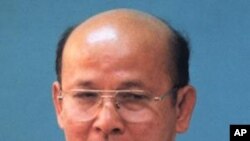Cambodia still lacks a culture of legal compliance, a fact that is exacerbated by the impunity enjoyed by top government officials and others, a veteran political analyst said Thursday.
Lao Monghay, who has spent years watching Cambodian politics and was a researcher at the Asian Human Rights Commission, told “Hello VOA” that law teaches “proper procedure,” but it is not yet respected in Cambodia.
“The culture of obedience to law means that you apply the law if someone commits a wrongdoing,” he said. “There must be punishment and convictions as stipulated.”
The evidence that many Cambodians ignore the law can be found all around, he said, starting with the breaking of traffic regulations and leading all the way up to the weakness of the National Assembly in passing laws.
Punishment under the law is not fairly handed down by the courts, and high-ranking officials often escape punishment altogether, he said.
Lao Monghay compared the current state of Cambodian law to a spider web that only catches the smallest insects, instead of upholding the constitutional principal that all are equal under the law.
No powerful officials or businessmen should see political intervention around it, he said. “The law is the law.”
Strong laws enforce peace and prosperity, he said.
“For example, the traffic law,” he said. “We all agree to use the right hand side of the road to drive, but if one goes left and one goes right, it’s chaos, and we don’t have peace, stability or order.”
Government spokesman Phay Siphan said the Cambodian government is developing each law and looking at ways to better apply them. “We are optimistic we will reach the right direction together,” he said.
However, Lao Monghay said the laws need reviewed by parliamentary or special committees, which can look into whether they are functioning properly or achieving their aims. He cited the immigration law as an example. “How is it being applied?” he said. “How many foreigners live in Cambodia? What about naturalization?”
Committee oversight on laws could then be published and debated. The executive arm of the government, controlled by the prime minister, should be beholden to the legislative side, that of the National Assembly and the Senate, he said.
Laws on the books should be archived and well known, he added. High-ranking officials should then follow those laws and set an example for the people.
“Most importantly, in public places, especially along the roadways, all leaders who have vehicles with license plates belonging to the police, military, government or National Assembly, and so on, they should respect the traffic laws together,” he said. “That is a good model for the people to follow.”




